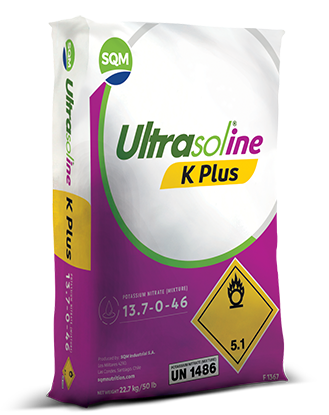Iodine (I) should be considered as a plant nutrient. That is the main conclusion of Kiferle et al., 2021. In that paper, the presence and identity of naturally occurring iodinated proteins in higher plants, which had never been described before, was published. Eighty-two iodinated proteins have been identified that take part in important biological processes in higher plants. Similar to deficiency in any other plant nutrient, a deficiency in iodine is predicted to cause yield losses.
In fertigated crops, grown in a commercial production setting, iodine deficiency can occur when the presence of iodine in the nutrient solution is below a sufficiency target value. This deficiency will be visible as sub-optimal root or leaf development, later flowering, lower fruit growth and lower resilience to stress, resulting in lower yields compared to a crop which has been supplied with sufficient iodine in the nutrient solution.
Production and vegetative growth of coffee of the type Conilon - Coffea canephora, similar to Robusta – can be severely restricted by extremely high temperatures and lack of water. High air temperatures may cause the denaturation and aggregation of proteins as well as an increase in the production of reactive oxygen species (ROS), which may result in stomatal closing and a reduction in the supply of CO2, which consequently reduces net photosynthesis and the production of coffee beans.
Iodine deficiency in a crop can lead to a lower tolerance of high temperatures and high transpiration rates. In coffee plantations in the state of Bahia, Brazil, irrigation guarantees high productivity and a final product of good quality. In this region of the country, water soluble fertilizers including potassium nitrate are routinely applied via fertigation to improve coffee bean yield under the prevalent hot conditions. It is predicted from its mode of action, that addition of iodine as a micro-nutrient in fertigation can help to acchieve high yields in regions where crops are known to suffer from high temperature stress.
To demonstrate the benefit of iodine under heat stress, Ultrasol®ine K Plus – potassium nitrate with iodine – was applied in a blend as the NPK “Dripsol®ine Café” on a seven year old plantation of Conilon coffee, grown in a sandy soil with a plant density of 2880 plants/ha. Potassium, nitric nitrogen and iodine were provided with Dripsol®ine Café , equivalent to 540 kg Ultrasol®ine K Plus /ha/season. Table 1 shows a program based on customized fertilizer blends developed by the agronomist team of SQM-Vitas Brazil. On one plot of 5 ha, Ultrasol®ine K Plus was applied and plant growth and yield on that plot were compared to the rest of the plantation where the same nutrient program contained Ultrasol® K Plus (without iodine).
The benefits of application of iodine were already convincing for the grower in the first season, when the coffee plants were developing their berries (Figure 1). The fruit bearing twigs showed a better development of next year’s flowering twig, with taller leaves of uniform size, while carrying at the same time a higher promise of yield. This indicates that the plants supplied with sufficient iodine had enough potential to feed both the filling berries and allow the plant to prepare good flowering branches for the next year (Table 2). The harvest (green beans) gathered in May and June was 18% higher in the sector where iodine was provided with potassium nitrate.
Table 1. Recommended program for Conilon Coffee based on four ws NPK-formulas available in Brazil

Figure 1. Good vegetative development on branches with a high load of berries on plants fertigated with Ultrasol®ine K Plus, which resulted in the higher green bean yield from these plants.
Table 2. Quantification of numbers of rosettes and number of leaves per branch preparing for next season’s yield.
Kiferle et al., 2021, https://doi.org/10.3389/fpls.2021.616868




